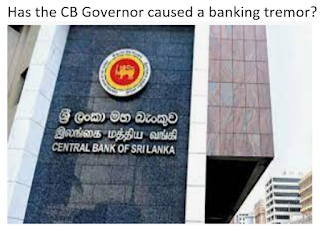Has the CB Governor caused a tremor among depositors?
Last night, through a breaking news, the CB Governor declared a 5-day banking holiday from 29th June as required to complete the Parliamentary approval process for the government domestic debt optimization in line with a IMF condition.
However, this has caused a panic and a tremor among the public as to the reason for such a banking holiday announced first time in Sri Lanka and as to whether whether their deposits are safe consequent to such debt optimization. My short article released to this blog last night briefed on serious concerns and facts relating to the press statement of the CB Governor. Breaking News - 5 bank holidays for govt. debt optimization - The purpose is questionable?
As I warned, early warnings are available today itself that panic depositors have started withdrawing deposits from some banks and, as a result, banking liquidity conditions are facing a noticeable crunch as usual.
Evidence on a bank liquidity crunch caused by a deposit outflow
This can be easily understood from the CB's daily transactions with banks and its holding of Treasury bills/bonds. This information is released to the public through its website on a daily basis. The highlights of following transactions indicate an liquidity crunch that might worsen shortly.
- Bank standing deposits or excess funds kept daily at the CB's Standing Deposit Facility Window at the interest rate of 13% have significantly declined to Rs. 150 mn today as compared to Rs. 182,860 mn reported on last Friday (23rd). The reason could be the urgent need of funds for bank payments.
- The CB has lent to banks amounting Rs. 110,100 mn through two reverse repo auctions.
- The CB's holding of Treasury bills/bonds has risen to Rs. 2,817,071 mn. This is a recorded increase of Rs. 360,734 mn from the holding on last Friday. In the past, the reason for the increase/decrease in this holding has been the CB's lending to the government through Treasury bills. However, the CB has not made any specific direct issuance of Treasury bills to itself today for this purpose. Accordingly, it appears that the CB has provided LOLR funds to some banks upon the discount or outright purchase of Treasury bills and bonds. This has become necessary as the CB has imposed a cap on overnight standing lending facility to banks only up to 90% of the statutory reserve requirement of each bank.
- Accordingly, banking system has suddenly confronted an additional liquidity requirement of nearly Rs. 653 bn today. This is a historic figure. The only reason attributable to this sudden liquidity crunch is the CB Governor's breaking news on banking holiday and unfounded assurance of deposits and and interest rates as being completely unaffected by the proposed debt optimization.
- Accordingly, the additional liquidity requirement today has been funded by bank excess cash of Rs 182 bn and CB's lending of Rs. 471 bn through new money printing.
Accordingly, it appears that his breaking news has caused a sudden tremor among depositors leading to a sudden outflow of bank deposits and a resulting liquidity crunch as seen from above information. This could even lead to a banking instability unless the public confidence in banks and financial institutions is urgently restored because it is natural to have a contagion of a debt and foreign currency crisis across the domestic currency sector given their inter-dependence and concentrations.
Therefore, the CB Governor should personally accept the responsibility of any banking turmoil if happens in next few days or during the debt optimization process due to the following reasons.
- First, only 30th is the special bank holiday newly announced as other four days are already known bank holidays in the calendar. Therefore, the announcement of a 5-day bank holiday through a breaking news is exaggerated and flawed and, therefore, has created an unnecessary panic among the public, especially as the CB Governor assured the safety of deposits. This is a serious policy and communication error.
- Second, according to his press statement, the government and Ministry of Finance have decided to declare this banking holiday to facilitate the debt optimization approval process. If so, he has just followed the government decision and declared the flawed banking holiday. Therefore, the CB Governor has compromised the CB independence despite the systemic risk triggers falling behind the government decision whereas the banking stability is a core responsibility of the Central Bank.
- Third, the language and contents used in the press statement are flawed, unfit and unproper. In fact, linking the maintenance of the banking/market stability through the banking holiday with the pending debt optimization process is highly unnecessary and questionable.
- In the event of any trigger of a banking turmoil if the deposit outflow continues, the CB Governor's fitness and propriety to hold the high profile post should be publicly questioned and inquired by the Minister of Finance in terms of the relevant provisions of the Monetary Law Act.
- In such a catastrophic event if happen, the government should take the full responsibility as the CB Governor is an appointment made by the government.
- The government should clarify the term "domestic debt optimization" used by the CB Governor in the breaking news press statements as against the term " debt restructuring" used by the government authorities including the President. Otherwise, the confusion might mislead the general public.
- If my views presented above are not supported by internal data, the CB should clarify with data.
(This article is released in the interest of participating in the professional dialogue to find out solutions to present economic crisis confronted by the general public consequent to the global Corona pandemic, subsequent economic disruptions and shocks both local and global and policy failures.)
P Samarasiri
Former Deputy Governor, Central Bank of Sri Lanka




Comments
Post a Comment